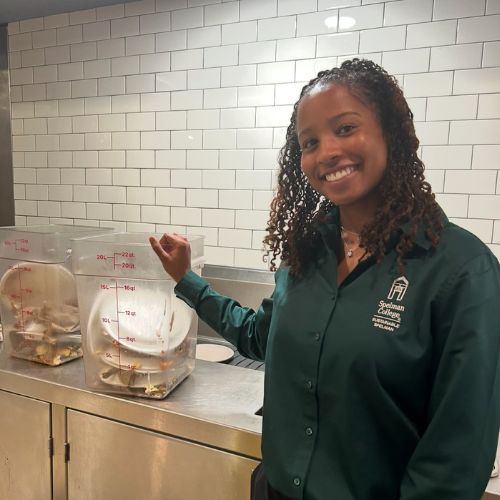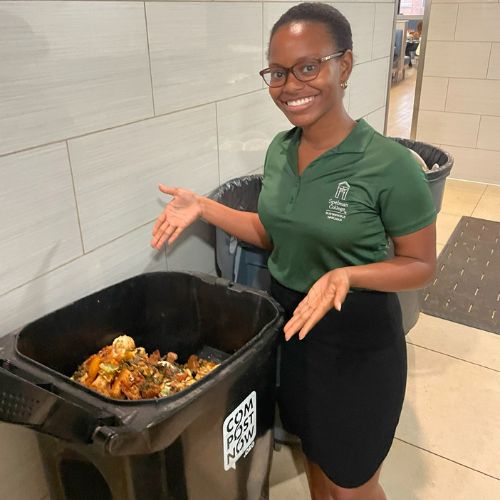Spelman College Composting Initiative Diverts Over 300,000 Pounds of Waste, Driving Climate Action
From Food Scrap to Climate Impact
 At Spelman College, sustainability is more than a campus initiative; it reflects a commitment to leadership, equity, and community care. As a historically Black women’s institution, Spelman recognizes that environmental stewardship and social justice are deeply connected.
At Spelman College, sustainability is more than a campus initiative; it reflects a commitment to leadership, equity, and community care. As a historically Black women’s institution, Spelman recognizes that environmental stewardship and social justice are deeply connected.
Spelman’s commitment to reducing food waste, as demonstrated by its Compost Now impact report, which began collecting data in January 2020, has yielded impressive environmental results, showcasing the power of intentional climate action. The program successfully diverted 301,649 pounds of waste, which translated directly into avoiding 784,288 pounds of carbon dioxide equivalent.
This significant reduction in greenhouse gas emissions is equivalent to taking 880,562 vehicle miles off the road. The waste diversion also prevented 31,372 pounds of methane —a potent greenhouse gas—from entering the atmosphere. Beyond emissions reduction, the resulting 30,165 pounds of compost offers a substantial community benefit, supporting 113 garden partners and providing the potential for them to grow 226,237 tomatoes, according to Compost Now, the College’s composting partner.
"This initiative demonstrates that with the right partnerships, training, and leadership support, campuses can achieve measurable environmental impact while engaging students and staff in meaningful sustainability action," said Michael Walsh, grounds supervisor.
According to the Climate Action Plan, Spelman College aims to achieve a 50% reduction in baseline greenhouse gas emissions by 2031, marking the 150th anniversary of its founding. The College intends to achieve carbon neutrality by, or as soon after, 2056, its 175th anniversary. Spelman has a goal to be net-zero by 2040. Net zero emissions is the point where all human-caused greenhouse gas emissions are balanced by their removal from the atmosphere, resulting in a zero net increase of these gases.
"Building composting infrastructure isn’t just about diverting waste; it’s about cultivating a campus culture of sustainability. Every pound of food we divert represents a step toward climate-conscious practices and operational excellence at Spelman,” said Iesha Baldwin, C'2019, sustainability coordinator.
Spelman's Sustainable Mission: Educating Students on Waste Reduction
 Spelman College, in partnership with Bon Appétit Management Company, is actively working to integrate sustainability into the campus dining experience. Bon Appétit is an on-site restaurant company that has offered full food service to the College since October 2023. According to Dawyn Patterson, the general manager of Bon Appétit, the collaboration with a sustainable company was a key motivator for the partnership.
Spelman College, in partnership with Bon Appétit Management Company, is actively working to integrate sustainability into the campus dining experience. Bon Appétit is an on-site restaurant company that has offered full food service to the College since October 2023. According to Dawyn Patterson, the general manager of Bon Appétit, the collaboration with a sustainable company was a key motivator for the partnership.
Patterson emphasized the educational focus of their work: "We’re working together to educate our Spelman sisters on the importance of waste and being sustainable." She noted that a primary hurdle is the lack of student awareness. "One of the reasons Iesha wanted to partner with Bon Appétit is that it is a sustainable company. It’s important to educate the sisters to be mindful of waste, being sustainable with what we’re putting back into the fields. A lot of them are not aware," Patterson said.
Overcoming the Awareness Challenge
Patterson highlighted that a lack of awareness about sustainable dining and environmental practices presents "some of the biggest challenges." She believes education is the solution: "The educational part of it is important. Once we educate the sisters, they will be happier to come aboard to make Spelman a sustainable college."
The ‘Away With Waste’ campaign directly addressed this issue. "A lot of the students gave us feedback. They weren’t aware of the composting until we did the Away With Waste. It brings visual awareness of the waste of what’s going on," Patterson explained.
Even outside of specific campaigns, Patterson confirmed that waste minimization is a daily priority. "We track our waste every day," she said. Bon Appétit uses precise methods like "batch cook (cook to order) and weigh the waste" to "control our waste to a minimum." Their commitment even extends to their ingredients: "Even with our vegetables, whatever we have left over, we turn into a stock. We strive to minimize waste as much as possible."
Plant-First Menus Drive Climate Action
 The educational efforts are complemented by a climate-conscious culinary strategy led by executive chef Lamont Fisher. The chef explained that Bon Appétit’s plant-forward philosophy minimizes environmental strain.
The educational efforts are complemented by a climate-conscious culinary strategy led by executive chef Lamont Fisher. The chef explained that Bon Appétit’s plant-forward philosophy minimizes environmental strain.
"We are more of a plant-based company. We try to place plants first," Fisher stated, noting that this impacts the climate "in a positive way because we minimize overproducing stuff." He drew a direct link to meat consumption: "We minimize the amount of gases when you eat too much beef and process the animals." The plant-first approach also supports waste reduction: "At most of our stations, you will see a lot of plants and vegetables, so we can help minimize the waste, compost it, or use it in stock.”
Fisher believes Spelman’s leadership is significant. "Spelman is one of the prestigious schools; a lot of people look to Spelman to see what we are doing," he said. "With that happening, that will also make people look at this school and say, ‘Hey, they are composting, they are minimizing waste and we can try to get on board just like Spelman.”
Reducing food waste is critical to advancing Spelman College's sustainability and social justice mission. This effort conserves resources, lowers emissions, and promotes a more equitable food system. By employing composting, redistribution, and student engagement, Spelman models climate leadership and lessens its environmental footprint. Aligning with Spelman’s legacy of empowering women, food waste reduction demonstrates that resource stewardship is a fundamental moral and environmental responsibility that fosters community and collective progress.
Spelman's Climate Action Plan Learn More About Sustainable Spelman
